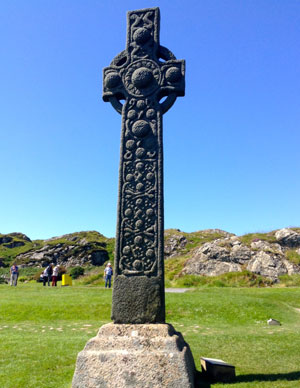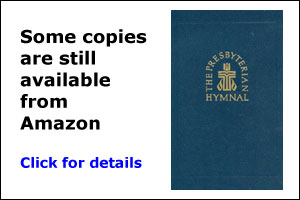
Be Thou My Vision
#450 in Glory to God
#339 in The Presbyterian Hymnal
The words of this hymn were composed in Ireland sometime before the tenth century. We cannot be sure who the poet was, but St. Dallán, who lived in the 6th century, is often credited.
St. Dallán's real name was actually Eochaid Forchella. He was probably a student of the more famous St. Columba, an Irish missionary who brought Christianity to what is now Scotland. Eochaidh is known to have written the formal eulogy of St. Columba who died in 597. Eochaidh probably received the nickname "Dallán" when he was a boy. It's a Middle Gaelic nickname that translates into modern English as "little blind one." or as we might say it today, "the blind kid."
This poem is written in a style called a lorica. This type of poem is a prayer for protection in battle and usually mentions various weapons and pieces of armor. In fact, the Latin word "lorica" was the Roman name for body armor. Many poets wrote in this style during the early Middle Ages. These poems/prayers were especially popular among nervous soldiers about to go into battle. This poem contains a stanza near the end that follows this more common formulation. It's a stanza that's not in our hymnal.
However, in both the first line and the last line, of this poem, St. Dallán, the blind kid, asks God to be his vision. Think about that for a minute. This blind kid knew all about needing vision. He was a living illustration of accepting the evidence of things not seen. He knew that he couldn't see the way forward. Through this hymn St. Dallán teaches us that faith is about admitting our physical and, more importantly, our spiritual limitations and trusting in God. He used the example of his physical blindness to open our eyes today to our own limitations and to believe in God to guide us.
During this pandemic, we don't have any idea what the future holds. When will your school open? When will we worship in the church sanctuary? When will the choir sing together again? When will you get to hug your grandmother? We used to be able to plan for the future; now . . . not so much. But we believe in an awesome God who controls the future and whose presence is our light.
St. Dallán, the blind kid, is teaching us to trust God when we can't see ahead. He knew what he was singing about.
Never forget that God loves you, and so do I.
Stu Smith
The Text
Be thou my vision, O Lord of my heart;
naught be all else to me, save that thou art;
thou my best thought, by day or by night,
waking or sleeping, thy presence my light.
Be thou my wisdom, and thou my true Word;
I ever with thee and thou with me, Lord;
thou my soul's shelter, and thou my high tower;
raise thou me heavenward, O Power of my power.
Riches I heed not, nor vain empty praise;
thou mine inheritance, now and always;
thou and thou only, first in my heart,
High King of Heaven, my treasure thou art.
High King of Heaven, my victory won,
may I reach heaven's joys, O bright heaven's Sun!
Heart of my own heart, whatever befall,
still be my vision, O Ruler of all.
The Hymn
A Version for This Pandemic

From the Rev. Stu Smith: My first visit to Camp Carew was when I came under care of the Presbytery of Southeastern Illinois at a meeting held at camp in 1987. I was ordained and served in Chicago for over 25 years. I received my Doctor of Ministry Degree from McCormick Theological Seminary in 2001 with a concentration in Religious Education. My doctoral thesis was Out of the Church Basement and into Cyberspace: Internet-Based Religious Education for Youth.
In 2014, I moved back to my family farm in Vermilion County. I'm very proud to be associated with Kemmerer Village and Camp Carew and the powerful ministry with young people that they provide.

Camp Carew welcomes campers from all religious traditions.
Camp Carew is a drug- and alcohol-free environment.



